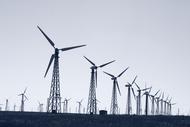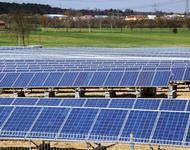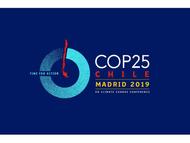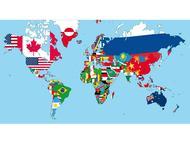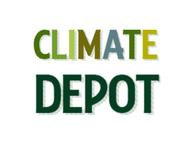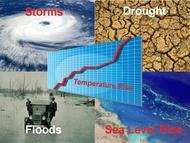Climate Change
Two days before Halloween, 2011, New England was struck by a freak winter storm. Heavy snow descended onto trees covered with leaves. Overloaded branches fell on power lines. Blue flashes of light in the sky indicated exploding transformers. Electricity was out for days in some areas and for weeks in others. Damage to property and disruption of lives was widespread.
That disastrous restriction on human energy supplies was produced by Nature. However, current and future energy curtailments are being forced on the populace by Federal policies in the name of dangerous “climate change/global warming”. Yet, despite the contradictions between what people are being told and what people have seen and can see about the weather and about the climate, they continue to be effectively steered away from the knowledge of such contradictions to focus on the claimed disaster effects of “climate change/global warming” (AGW, “Anthropogenic Global Warming”).
People are seldom told HOW MUCH is the increase of temperatures or that there has been no increase in globally averaged temperature for over 18 years. They are seldom told how miniscule is that increase compared to swings in daily temperatures. They are seldom told about the dangerous effects of government policies on their supply of “base load” energy — the uninterrupted energy that citizens depend on 24/7 — or about the consequences of forced curtailment of industry-wide energy production with its hindrance of production of their and their family’s food, shelter, and clothing. People are, in essence, kept mostly ignorant about the OTHER SIDE of the AGW debate.
Major scientific organizations — once devoted to the consistent pursuit of understanding the natural world — have compromised their integrity and diverted membership dues in support of some administrators’ AGW agenda. Schools throughout the United States continue to engage in relentless AGW indoctrination of students, from kindergarten through university. Governments worldwide have been appropriating vast sums for “scientific” research, attempting to convince the populace that the use of fossil fuels must be severely curtailed to “save the planet.” Prominent businesses — in league with various politicians who pour ever more citizen earnings into schemes such as ethanol in gasoline, solar panels, and wind turbines — continue to tilt against imaginary threats of AGW. And even religious leaders and organizations have joined in to proclaim such threats. As a consequence, AGW propaganda is proving to be an extraordinary vehicle for the exponential expansion of government power over the lives of its citizens.
Reasoning is hindered by minds frequently in a state of alarm. The object of this website is an attempt to promote a reasoned approach; to let people know of issues pertaining to the other side of the AGW issue and the ways in which it conflicts with the widespread side of AGW alarm (AGWA, for short). In that way it is hoped that all members of society can make informed decisions.
Climate Change News
What the COP?
- 1/21/20 at 06:00 AM
Highlighted Article: Three Rules About Climate ‘Event Attribution’ Studies
- 1/20/20 at 11:46 AM
Highlighted Article: 2019 Science Data Refutes Climate Alarm On Every Front
- 1/16/20 at 06:00 AM
Reparations for What? - Part 2
- 1/14/20 at 06:00 AM
Highlighted Article: Year in Review 2019: Climate Policy
- 1/9/20 at 06:00 AM
Reparations for What? - Part 1
- 1/7/20 at 06:00 AM
Highlighted Video: CO2-induced Benefits to Plant Water Use Efficiency
- 1/2/20 at 06:00 AM
2020 Prospective
- 12/31/19 at 06:00 AM
Highlighted Video: Why renewables can’t save the planet
- 12/26/19 at 06:00 AM
2019 Retrospective
- 12/24/19 at 06:01 AM
Highlighted Article: Skeptical Climate ‘Talking Points’ 36-Page Report Released at UN Climate Summit in Madrid
- 12/19/19 at 06:00 AM
"Astroturf"
- 12/17/19 at 06:00 AM
Highlighted Article: Global Warming Quotes & Climate Change Quotes
- 12/12/19 at 07:15 AM
Weather/Climate Events
- 12/10/19 at 06:00 AM
-
Headlines
Search Headlines-
Labour’s Net Zero plans collide with political and economic reality
- Net Zero Watch
- July 11, 2025
-
Sea Ice Data Cut-off: Climate Alarmists Panic, But Is It Really a Crisis?
- Watts Up With That
- July 10, 2025
-
China’s energy dominance in three charts
- MIT Technology Review
- July 10, 2025
-
The economic imperative for nuclear power
- CFACT
- July 10, 2025
-
German Professor: 2022-2024 Warming Mostly Linked To Natural Factors, Not CO2
- No Tricks Zone
- July 10, 2025
-
No, 170 Londoners Didn’t “Die of Climate Change” Last Week
- Daily Sceptic
- July 10, 2025
-
Al Jazeera Wrongly Hypes a Climate Connection to Recent European Heatwaves
- Climate Realism
- July 10, 2025
-
Scotland’s Tidal Bet: Net Zero, Net Loss
- Watts Up With That
- July 10, 2025
-
Robert Bryce: US Is Screwed on Rare Earths—And China’s Not Letting Go
- Financial Sense
- July 10, 2025
-
Energy Policy vs. Climate Dogma: Why the Voters Aren’t Marching to the Green Revolution’s Tune
- Watts Up With That
- July 9, 2025
-
Dems’ Climate Pivot Probably Just Smoke And Mirrors
- Daily Caller
- July 9, 2025
-
-
Scholars Wanted
 The Right Insight is looking for writers who are qualified in our content areas.
The Right Insight is looking for writers who are qualified in our content areas.



